GodGiven
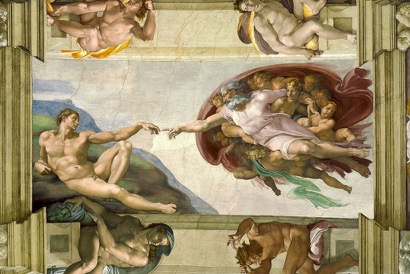
The Creation of Adam; by Michelangelo; 1508–1512
"We're never less powerful than when we're armed and asserting our folly as some GodGiven right …"
I was up early again this morning pondering how I might distinguish between the various rights asserted by those around me. The right wing gun nuts insist that they merely enjoy a GodGiven right to bear arms, though I recall no actual scripture reporting the granting of this authority. Others proudly sing that God somehow "shed his grace on thee," which I interpret as meaning "God shed his grace on me", or somebody, though I have no clue what shedding grace might entail or what might logically result from this act. Mention of it does seem to reliably encourage pride, the sort of pride which supposedly does not immediately precede a fall of any kind. Grace seems the iffiest of gifts, whomever might bestow it, for it always seems more resident in the eye of the bestowed than anywhere else. In spite of the widespread belief in the existence of godless heathens, each and every war ever fought seems to have been engaged in by self-certified God's own representatives on this earth versus self-certified God's own representatives on this earth, and expressly for the greater glory of God; not their God, but the one and only true God, who just happened to be on "our" side.
God gets used as an excuse for almost everything, and I suspect that she's not all that pleased with these attributions.
Hop(e)
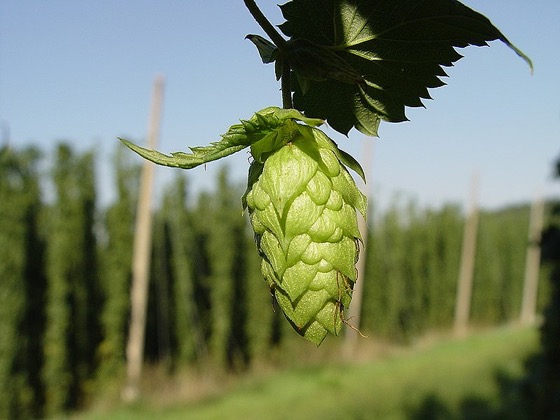
Hop flower in a hop yard in the Hallertau, Germany (Wikipedia)
"Something significant seems to have stuck with me …"
My father, who was born near the Willamette Valley German immigrant town of Mt Angel, told of working hop harvest. Long days standing on the tall bed of a high-sided flatbed truck, reaching up to cut the cords holding the twenty foot tall vines into the truck bed would leave his forearms raw. Even then, the work beat picking beans, which was stoop labor and hard on the back and also left forearms chafed. I'd seen the hop yards, since I'd grown up near the preeminent hop growing region in this country, and dreamed of growing my own someday. I'd tried several times, always with disappointing results, short, rather sickly specimens yielding few of the treasured cones. I'd crafted small pillows filled with dried cones, which are said to induce sweet dreams, but had never more than dabbled in their cultivation until this year, this seemingly hopeless growing season. I'd late last summer finally found a plant at a local nursery, for which I'd paid a small king's ransom, and planted it in front of the fine, tall cathedral window out front, thinking that perhaps it might at least yield some interesting shade. That plant grew a begrudging six feet or so before an early snow halted further progress. I pruned it to the ground and forgot about it until Spring, hoping that it might prove eternal enough to sprout up a second year.
This Spring needed hope like no other I'd known.
ShiftIn
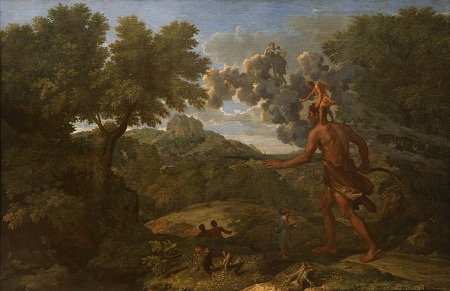
Blind Orion Searching for the Rising Sun, Nicolas Poussin, 1658
"I'll relish what little's left …"
In these mid-latitudes, weather comes out of the West, moving opposed to the sun's progress. Little of consequence comes out of the East, which is where we send our weather when we're finished with it or it's finally finished with us. Occasionally, some counter-clockwise rotation kicks in to produce what we call upslope winds. These can spawn magnificent thunderstorms in the Summer and genuine dumpers of snow in the Fall, Winter, and Spring, but these bring nothing in the way of lasting change. They appear and leave almost as quickly, handing the reins back to the West winds again. The only question is always which direction, Southwest or Northwest, will the weather come. Through summer, Southwest winds prevail. One day, a ShiftIn happens and the prevailing winds starts sliding down from Idaho or Montana pulling in Northwestern weather. This ShiftIn comes quickly and never quite fully reverses again that season, a certain sign that autumn's coming, though it might have been a hundred degrees in the shade just the day before.
Real rain, not that second or third-hand stuff stuff passing up and over Arizona from the Gulf of Mexico, but genuine North Pacific rain drenches everything.
FalseEquivalence

Gino Severini, aged 30, at the opening of his solo exhibition, Marlborough Gallery, London, 1913
"Wallowing in FalseEquivalence demonstrates an ignorance unbecoming anyone."
One of these things is not like the other. This one statement might properly summarize human existence, for we seem to (or, at least I seem to) constantly make distinctions. When my kids were small, we parsed the entire universe into two broad categories, Yum and Yuck. With these broad two generalizations, infinite variations might exist, but no Yums ever became Yucks, and vice versa. Once initially classified, little risk of mistaking one for the other existed. One was definitely not like the other. This universe, though, cannot be parsed so conveniently. We encounter many borderline cases, greyscale experiences which might seem indistinguishably similar, though actually different. Multiple classifications are also common, such that similarly-colored objects might also be more finely graded by size or shape. As the Ancient Chinese used to insist, ten thousand differences might exist between any apparently similar objects or events, but we've evolved into ever less discerning generalists, it seems, satisfied to call both apples and oranges 'fruit,' and leaving further distinctions pat, and we're fine with that other than the occasional disagreement over classifying tomatoes. Fruit or vegetable? A fruit that tastes like a vegetable or a vegetable crudely misclassified as a fruit? Wars have started for less.
All this distinction-making might serve to help us make sense of the world, but a tremendous amount of skill seems necessary to make proper distinctions, to avoid misclassifying one thing as another when it really isn't.
SmolderingPants

Psalter (the 'Shaftesbury Psalter') with calendar and prayers
Origin England Date 2nd quarter of the 12th century
"We might have been born to advance higher purposes of civilization …"
We apparently love to be lied to. I find no other way to explain civilization. Societies and cultures might exist solely to maintain and reinforce myths, reassuring lies sustained for solace. We seem to not-so-secretly believe most everyone else a rube, easily fooled, many emphatically insisting not that we hold certain truths to be self-evident, but that we're good for keeping the dirty little secrets quiet. I suspect that most of us know too well how deep down lame we are inside, how utterly dependent we are upon lying to ourselves and to pretty much everyone else to maintain some cobwebby semblance of self-esteem. Even if the much-vaunted truth actually made good on its promise to set us free, we'd most likely choose to remain in slavery to the studied reassurances that, no, these pants do not make our butt look big. We've elevated the completely spurious Energy Drink Industry to comprise a significant portion of our retail economy. Need I say more? Sugar water spiked with caffeine, and some even spiked with measures of, excuse me, bull pee. I mean, how gullible must we be to drink that crap? It seems to me that this reality simply could not be without a deep and underlying identity insisting that you absolutely must lie to me and that I solemnly promise to keep the little secrets between us. We apparently sincerely believe that we cannot handle the truth.
We wear SmolderingPants which, if the old adage — where there's smoke, there's also fire — holds true, our pants are actually on fire.
Heraclitus'Insight

On the Island of Earraid, N.C. Wyeth, 1913
"No man ever steps in the same river twice", Heraclitus, Fifth Century B.C.
"No squirrel ever entered the same deer meadow twice."
Heraclitus might just as well have said that no man ever steps into the same morning twice, or sits in the same chair, or reads the same book. Further, he might have just as credibly insisted that no two people ever read the same book, not even once. Any author might, as I have, ask, "What book did you read?" when receiving feedback about their work. We seem to live within an almost constancy, surrounded by seemingly familiar objects and people, but these relations seem surprisingly fragile as we continuously rediscover that each might not be quite what we'd earlier concluded about them. Shocking moments of inconstancy punctuate our experience here, amplified, no doubt, by our abiding sense that things properly stay more or less the same, when they don't and never have. My continuing disorientation might well be self-inflicted, but I cannot seem to uncover any balance or Golden Mean between these two apparently opposing forces: stability and flux. Heraclitus also insisted that "panta rhei", everything flows, that nothing ever stays the same. I wonder why, then, we evolved to believe so vehemently in constancy, that everything's more or less frozen in place?
Glib self-helpless pundits blithely insist that the more things change, the more they stay the same, by which they might mean that most change seems insubstantial, a rearrangement of the proverbial Titanic's deck chairs.
'Vesting
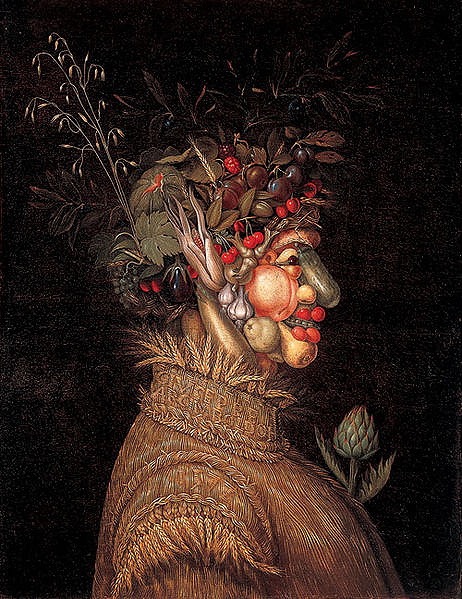
Giuseppe Arcimboldo, Summer, 1572
" … 'Vesting providence with our experience again."
Most of the growing year involves much waiting, culminating in a few shortening days 'Vesting: harvesting, preserving, labeling, and storing away for later use. There's no shortage of delightful fresh produce groaning shelves this season, the produce stand suddenly the most popular stop on everyone's rounds. Would that I could find this freshness year 'round, but I savor what I find when I find it. We neglected canning tomatoes last 'Vesting season, and lived to deeply regret that decision once sequestration stripped our larder shelves. For the first time in years and years, we reduced ourselves to buying factory canned, and regretted every second of the experience. We'd thought ourselves well-enough provisioned before our world sucked in on us. By then, it was way too late to rethink, and we sucked it up and tolerated the consequences. We'd foregone perhaps the single most solidly imprinting experience of the year last 'Vesting period. We'd been traveling when the tomatoes came in and recovering through the balance of the season. We missed that chance.
Now, we insist that this must never happen again.
HownDogAfternoon
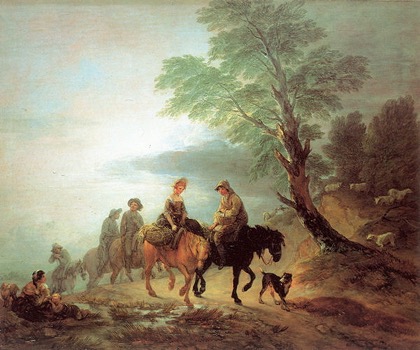
Going to Market, Early Morning by Thomas Gainsborough, circa 1773
"We're partners here …"
If I'm going anywhere today, I'd be wise to go early, before the sun and the smoke and the aridity become even more determined to have their way with me. I thought I caught a patch of blue in the sky this morning. The wind shifted overnight so I woke without my eyes stinging themselves shut again. My throat feels rough and the consistency of tapioca pudding, sinuses screaming again. By the last week of August, the elements combine to produce a neigh-on to unlivable environment. The lawn feels crispy underfoot regardless of gold-plated sprinklings, thin underlying soils seemingly thinner after rainless weeks. The monsoon never showed up this year. As each day progresses, the slight almost cool of early morning gives way to another baking, the sun, even through the smoky batten burns without thinking once. The sunrise lasts much of the morning as the smoky haze extends the reds and oranges until nearly noon. Afternoon seems fit for little more than napping, perhaps in a puddle of fine dust, the way an exhausted HownDog might approach it. Time fit only for practicing hibernation. There's no place to escape to but dreams.
The view from every lookout seems cruelly foreshortened and spare. I drive in a tunnel of heavily amended air
MuseDay

Mérode Altarpiece (or Annunciation Triptych) is an oil on oak panel triptych, now in The Cloisters, in New York City. It is unsigned and undated, but attributed to Early Netherlandish painter Robert Campin and an assistant. The three panels represent, from left to right, the donors kneeling in prayer in a garden, the moment of the Annunciation to Mary, which is set in a contemporary, domestic setting, and Saint Joseph, a carpenter with the tools of his trade. The many elements of religious symbolism include the lily and fountain (symbolizing the purity of Mary), and the Holy Spirit represented by the rays of light coming through from the left hand window.The central panel was completed after 1422, likely between 1425 and 1428. [en.wikipedia.org]
"She insists that she's an A-Me instead."
She despises the moniker, or certainly says that she does. I persist using it, and not merely out of perverse habit. (In her birth family, once anyone learned what you hated, that knowledge guaranteed that you'd thereafter be inundated with it.) She was by any measure born the runt of her family, a premie as we call them today, and so had to stay in the hospital for several days after her birth. She claims that this rude arrival affected her. She still remembers feeling abandoned and alone when isolated from her newly-gained home. Being third in birth order, ultimately the middle, she was born behind, destined to always playing catch up, a childhood-long competition she was destined to lose. She won the race to produce the first grandchild, though, and so was carrying him at her high school graduation, whereupon she went into exile to live with hostile in-laws and a sullen showband drummer of a husband. She coped. She lived as a band wife for almost a decade, holding menial jobs to pay bills, including a stint cutting meat in a huge packing plant and later, as a Tupperware Lady®.
She finally decided at twenty-five to put herself through school, which she managed to do in fairly short order, ultimately choosing her own curriculum to satisfy her own notions of how that work really should be done.
Q

Guy Fawkes before King James, Sir John Gilbert, Circa 1750
"They ache for judgement day."
They meet in out-of-the-way places, a shed on one member's family farmstead, warmed by a barrel fire fed with scrap lumber. Their meetings combine the camaraderie of a frat brother kegger with the solemnity of religious retreat. One member, typically the host, leads but never in a domineering way, for these men never responded well to dominion. Lifelong misfits, they hold exclusively non-professional jobs, laboring, mostly. They to a man struggle to make ends meet and always have. Those who managed to make it through high school, graduated with a certificate in serial humiliation, for they struggled with their studies, never quite grokking college preparatory courses in math, literature, or the sciences. They hold grudges, not degrees. Many showed early on real promise in the mechanical arts, auto repair, electronics, and the Future Farmers of America programs. They're all hunters. Each owns several guns and each considers these the pinnacle possessions of any freeman. They insist that they're freer than they've ever once felt and meet to garner their resources for the oncoming assaults on what they authentically revere as their way of life.
They think themselves worthy inheritors of Colonial-era beliefs, thinly evolved first or second-generation interpretations of The Rights Of Man and The Wealth Of Nations, though none have read the original documents, much less considered their many contradictions.
deCENTcy
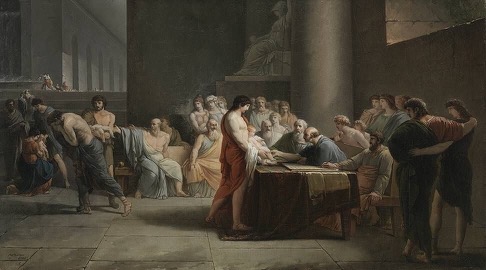
Jean-Pierre Saint-Ours, The Selection of Children in Sparta, 1785
At the age of 7, Spartan boys were removed from their parents' homes and began the “agoge,” a state-sponsored training regimen designed to mold them into skilled warriors and moral citizens.
"I genuinely want you to win, too, though never at any cost, …"
In this world where everything seems to have a price tag and few of us understand the cost of anything, deCENTcy often seems lost in the accounting. Schemes surround and smother us. Deals get made. Compromises demanded, the Bait And Switch almost obligatory. Fair deals, the rarest of all deals. Cheap-but-Good seems more weighted in favor of cheapness than goodness. Loyalties seem far too easily persuaded to switch support to shave a few pennies off some bill. Some commodities solely serve ostentation, valued by the excess expended to acquire them, for bragging rights or simply to rub some less fortunate's face in the deal, offered only at auctions where we're perennially out-bidded. Our democracy sometimes seems like that. We wonder why we should even bother entering the game. Our politics have been up for sale to the highest bidder for generations now, and only DeCENTcy seems absent from the equation because DeCENTcy costs almost nothing, a red cent lost in rounding among bilious billions and terrifying trillions. Where's the marketplace in deCENTcy these days?
Oh, here it is, right close to home.
LOM
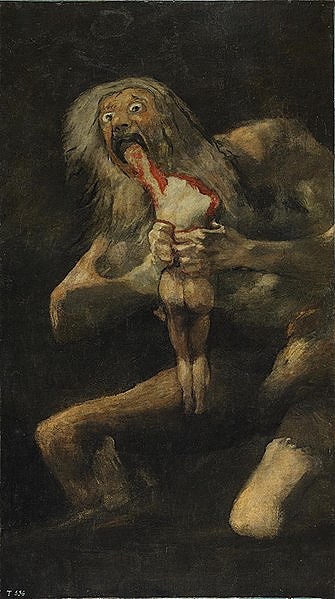
Francisco de Goya, Saturno devorando a su hijo [Saturn devours his son], (1819-1823)
"The more I've experienced, the less I understand."
Birthdays increasingly become subdued celebrations as I age. A passing embrace, a few quick questions asking what they might do for me, an overwhelming number of Facebook greetings, each unexpected, of course, and each relished as a slightly embarrassing excess. I register my appreciation in a sort of passing because I do not feel as though aging or even counting ages accomplishes anything. I spent the day feeling rather full of myself, greatly gifted by the virtual presences surrounding me and I fear a little too off-putting to those closer to home. I find attempts at celebrating at root unnecessary. They elicit little more than sincere 'aw shuckses' from me, which might mean that I'm finally entering that inevitable stage of being, that I'm turning into a LOM, a Little Old Man.
I've noticing myself getting ever more stuck in my ways, as if the sum of all my days had reached maximum absorption of experience, as if my existential larder might be almost full.
RegularOrder

Going West--1933, Boardman Robinson, 1933
"I'm not fleeing anywhere …"
I've started this story three times already, discarding each iteration in growing frustration. I wanted to say how it feels for me to be alive this morning, but a certain seething crept into each attempt. I do not feel like an angry old man, just one aching for RegularOrder. I've had it up to somewhere with stupid millionaires dominating conversations. There seems to be no better indicator of absolute inanity than wealth, as if mammon actually lowers IQ. The disruptive elements, the great inventors and marketers and promoters, seem to lack any sense of RegularOrder, the baseline regulating force each of the rest of us rely upon to maintain our sanity and serenity. I feel lucky this morning to be turning three score and nine. It's my birthday, for cripes sake, and I feel satisfied enough just to take what I've been given. The decktop petunia garden's at her peak, perfume creeping up and into the master bedroom windows. My hop(e) vine's cones have grown heavy with pollen and ready for harvest. The front garden's in furious bloom attracting hummingbirds and bees and grasshoppers in profusion. The cats, still kittens a few short weeks ago, have almost learned to come back home on their own after they escape.
The wind seems to have shifted.
GrudgeWork
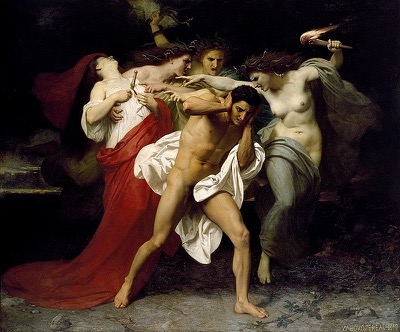
The Remorse of Orestes by William-Adolphe Bouguereau, 1862
"La vengeance est un met que l'on doit manger froid" Charles Maurice de Talleyrand-Périgord (1754–1838)
"Revenge is a dish best left off the menu"
Setting out to settle any score seems to reliably produce some variant of the opposite of the imagined outcome. Revenge is not, as Talleyrand-Périgord insisted, a dish best served cold, but a dish best left off the menu. One might easily imagine settling some score, as the saying goes, 'once and for all', but such action produces reverberations guaranteeing that those scales will very likely be thrown even more permanently out of balance. Should the reaction be anything close to equal and opposite, a tragic cascade will likely ensue. Dogs chasing their own tails easily then becomes the new normal, for grudge lust never finds satisfaction from any GrudgeWork, however dedicated. Getting even amounts to a distraction, always under the influence of our worse angels. The reparations exacted upon the Weimar Republic following WWI produced Hitler and WWII, even though the French and British firmly believed that their demands were just. Germany had, after all, aggressively thrust itself upon France for no reason other than its deeply held grudge over having missed building its own empire. Why not simply swipe another's empire and thereby better balance the score? We now too well know why, but we never seem to learn.
GrudgeWork properly describes our current administration's approach to governing.
NothingAndBeingness

Time Saving Truth from Falsehood and Envy, François Lemoyne, 1737
" … they'd come to understand and trust that the horse knows the way."
I believe, perhaps fallaciously, that I possessed when I was born every skill I later manifested. Contrary to the historical record, not even the KnowNothings ever actually knew nothing, not even those swearing to reelect our sorry excuse for a President can truthfully claim this state, for nothing's always been fundamentally unknowable and to claim otherwise only proves my point. I have not so much assimilated others' skills, but found ways to relate theirs to my own, nascent and previously knowable until after some small or huge revelation. I perceive this world as a network of invitations in constant struggle against the forces of formal education, which seem determined to claim ownership of knowledge and skill so that they might sell it for notoriety and profit. Knowledge, interestingly, also fails to qualify as knowable, though some certainly seem to exhibit clear possession. It might be that knowledge and even understanding possess us and not the other way around, once one's found fertile ground them to usefully relate to it.
If I would have had to know how to write before writing, I might have become an eternal student, Hell-bent on learning something unassimilatable by that means.
RueTeen
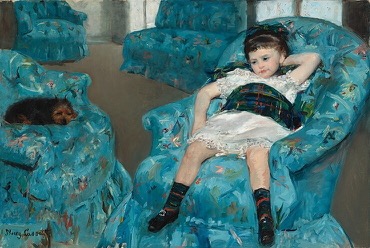
Mary Cassatt, Little Girl in a Blue Armchair, 1878
"Some blessed shirker inside me has been complaining …"
How many times can I repeat an activity before repetition renders it banal and boring? What begins as necessary and refreshing might well become a crushing obligation over time. A perfectly timed taste of wine too easily slumps into an unmemorable second glass or a forgettable third. I've heard of activities so enjoyable that they never eventually bore anyone into a coma, but never actually experienced one. Experience seems to sum into something quite distinct from mastery, something more akin to a tragedy of over-familiarity, rendering almost alien through studied repetition, leaving the practitioner aching only for a beginner's mind again, a refreshing starting all over again from the bottom. Our Damned Pandemic has highlighted the utter banality of many of my RueTeens, activities I now rue performing and perform with all the mindful tranquility of a slighted teen. I might agree to do anything besides what I've become altogether too accustomed to doing after the umpteenth time anticipating doing it again.
Dinner, once creative opportunity, has become an utterly boring chore.
Chokin'

Fainting by Pietro Longhi, 1744
" … this, too, was intended to be a part of the deal …"
This terrarium's oxygen seems just about used up. We closed up the place as the smoke concentrated, using fans to keep the suddenly suffocating inside air moving, but it moved increasingly listlessly anyway, suddenly neither fresh nor refreshing. We continued breathing, but substituting low octane for high test air, each breath an increasingly sorry pretender to what we'd grown accustomed to experiencing. Usually, the breeze here brings continual relief down from The High Country, some of the freshest air in the world. During fire season, it billows. Nearer the fire lines, ash falls like heavy snow. Here, it's only smoke bringing persistently itchy eyes and a choking sensation deep in the throat. And there's no respite. No cool glade to escape into. No secret room in the basement unaffected by this intrusion. I choose to sit on the deck as the day grows long, nose running and eyes tearing up. I get scowled at for leaving the slider open.
We're in no real danger here.
Smokin'

The Smoker, a presumed self portrait of Joos van Craesbeek, 1635-36
"I closed the side window so the breeze can't push fresh puffs inside on me."
I was a dedicated smoker in my youth, sneaking smokes out on the football field during lunchtime at high school. Slinking around, I mostly learned how to sneak there. My parents were raging liberals when it came to smoking, figuring that they'd rather we not sneak around at home. My dad, brother, and I thereby inflicted second-hand smoke on everyone else in the house, not so much indifferent as ignorant of the damage we inflicted. I quit in a fit of righteous self discipline on the new year when I would turn thirty-five, figuring that smoking was a young man's game and I was headed in the wrong direction to avoid one of the dead certain afflictions should I continue the habit. The Insurance Company had just before instituted a strict no smoking policy and I didn't relish becoming one of those poor souls forevermore hovering around a drizzly courtyard. We speak now of castes and classes. When I stopped smoking, I was immediately upgraded a class. I bruised my left nipple for months after from constantly tapping my shirt pocket, checking for the accustomed pack which was no longer there to cushion my panicky inquiries.
I later picked up cigars, fine little Dominican ones which I fallaciously claimed had been hand-rolled on the thighs of virgins.
DogWhistlingInTheDark
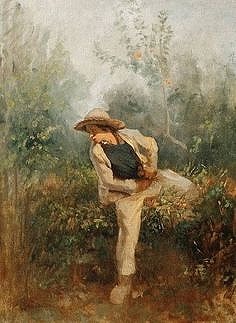
The Poacher, Jean Pierre Alexandre Antigna
"We're the ones inheriting that wind."
By mid-August, mornings smell of campfire, though campfires have been banned since May. The primary East/West freeway across the state was yesterday closed until further notice due to a zero contained wildfire burning through Glenwood Canyon. Even the transcontinental train service was suspended until further notice. The round and about alternative route, a twisty two lane up through Aspen, was closed after a semi-truck jackknifed on a tight switchback turn. Sunrises and sunsets come in brilliant oranges and reds and our usual pristine view up the Front Range is filtered through a smutty haze. We're suddenly all smokers again, shirt collars reeking and sinuses clogging. The sign at the county park reminded hikers that rattlesnake activity has been reported in the area, so keep those pets leashed and keep yourself safe. Everyone leaves reminding everyone else to stay safe. The world seems especially dangerous right now.
The Presidential race is off and running now that Biden has named his running mate, a formidable African American/Asian woman the opposition can't yet properly denigrate.
Disorienteering
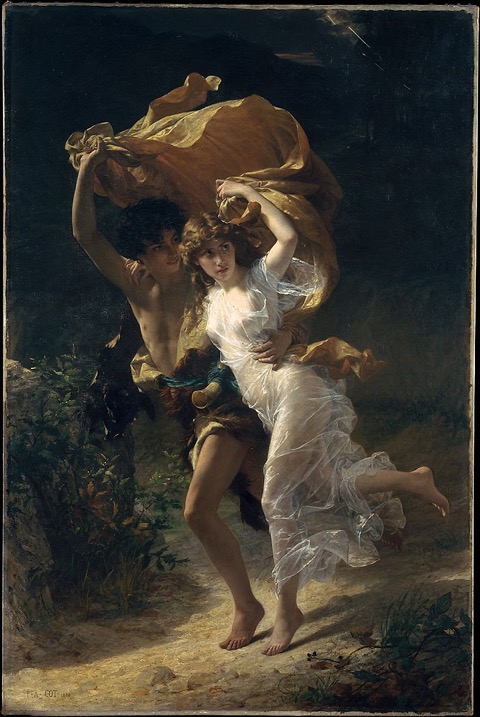
Pierre-Auguste Cot: The Storm, 1880
" … I lagged my way back home."
Sequestering provides few opportunities to get lost in anything more diverting than another fresh novel, fleeing ever inward as an antidote to such outward sameness. Suppers eventually come to seem like reruns. Didn't we just have this last night, or was that just the night before? Exploring the unchartable territory west of boring, each little chore hardly seems worth doing, fresh adventure insecurely out of reach. I've grown to know my neighborhood perhaps a little too well. Discovery only ever happens once, after that, it's simply not discovery anymore. An ennui settles over the proceedings and forward comes to feel like warmed over receding, a form of retreat. Mid-August brings vacation season for one excellent reason. It's damnably difficult to get lost at home. I know where every left turn will take me. I understand what's just over every hill. The thrill of discovery eventually slips beyond anyone's grasp and we're compelled to just disappear in favor of some Disorienteering.
We vacate to get ourselves lost.
Gumshoe
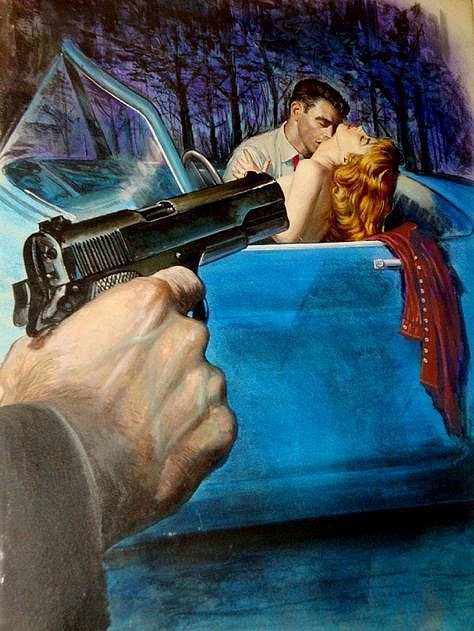
Harry Barton Vintage Pulp Art Illustration
" … when Amazon options it for the limited series."
As an enthusiastic consumer of Detective Fiction, I fear for the future of this genre. I've not yet encountered a character in any Gumshoe novel who wears a face mask other than to bump off a liquor store, and those masks don't seem right for blunting any plague. None of the heroes seem the sort to slip unnoticed into a cocktail bar while wearing a mask, and cocktail bars have been closed for months, anyway. Where do nefarious schemes get hatched in pandemic times? I'm trying to imagine C. J. Box's Joe Pickett or James Lee Burke's Clete Purcell operating in a post-pandemic world or Longmire issuing citations for violating mask mandates. Masks might inhibit identification of the Gumshoe's prey, though I notice that John Sandford's latest thriller came out under the timely title of Masked Prey, though there were no masks prominently displayed in any part of that story.
Few advertisements, even now, six months into this pandemic, feature mask-wearing characters.
TakingAPass

Thomas Moran: Mosquito Trail, 1874
" … a full immersion experience one can almost bring back home with them."
This Damned Pandemic encourages a discernment and detachment in me. I no longer feel free to enter just any establishment. As if I possessed a picky palate, I simply will not enter any restaurant, not yet. I might consent to a drive through or an accelerated step in to grab something to go, but I will not slow down long enough to even leave a footprint on my way through. I wake some mornings aching for a decent order of hash browns smothered in green chile gravy like only an authentic greasy spoon diner can produce, but I will not reduce myself to enter any such establishment. Not yet. Not now. I sense that I'm becoming somewhat of an expert at TakingAPass, just driving past though my desire might compel me to stop. I sense myself a budding aesthetic, like a solitary mountaintop meditating wise man, though I know for certain that I remain a simple wise guy deep down inside. I'm TakingAPass because I've grown to distrust all reassurances that we're bringing This Damned Pandemic under any sort of control. We're still learning how this devil works, and until we deeply understand it, I will continue to choose to just drive by most roadside attractions, even when I'm starving for that plate of smothered hash.
Living in Colorado offers some compensations.
LittleDeaths
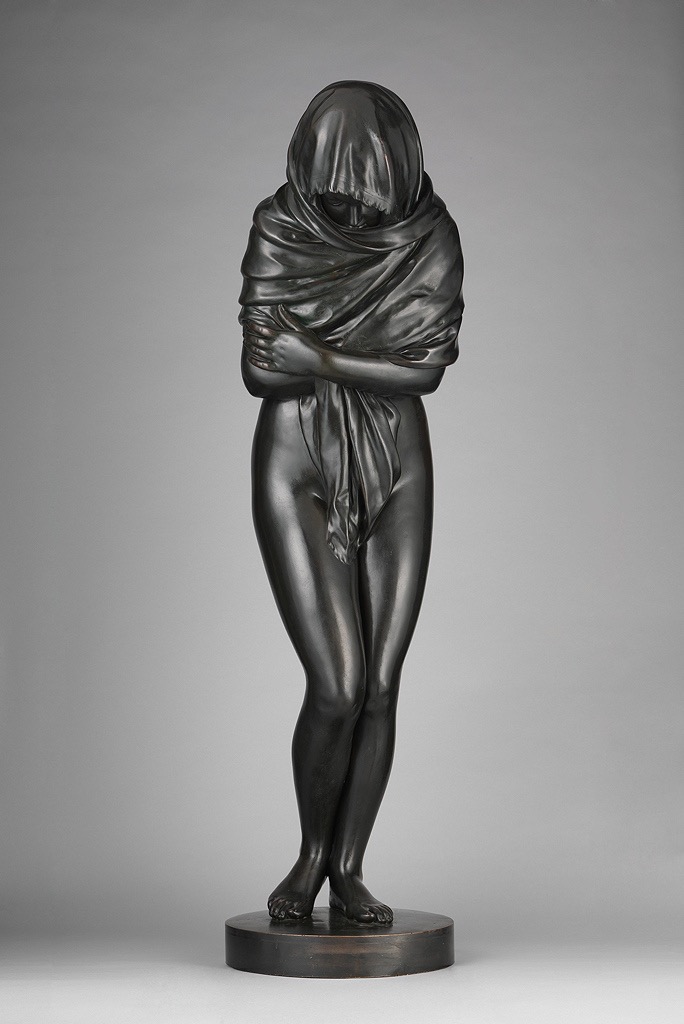
Winter by Jean Antoine Houdon, 1787
"Background moves into foreground sometimes …"
Life presents many LittleDeaths, sudden absences disrupting flow. These experiences might seem mere inconveniences to any casual observer, but the principal deeply feels their sting. Yesterday, returning from our usual larder stocking excursion, I felt my shirt pocket for my eyeglasses and found them AWOL, missing from their pocket perch. I initiated a quick search, well experienced with discovering that I'd set them down somewhere. I could not immediately recall where I might have left them, but I reassured myself that they could not be far. As near as I could tell, they were precisely nowhere: lost, gone, disappeared. I quickly engaged in denial, sensing that they simply must be near, even going so far as to just wear my prescription sunglasses to read a chapter or three in the latest library book. It would too soon turn dusk, though, so I headed out to the drug store to score some cheaters, cheap magnifying lenses to help me make do.
I still firmly believe those glasses will show up, though I'm plotting a visit to my optometrist tomorrow morning.
Worker

Jean-François Millet, The Gleaners, 1857
"I might have been a gleaner."
I am most emphatically NOT a Worker. I haven't punched a time clock since I was in my teens, and even then, I found that experience to be anything but uplifting, demeaning. I can't seem to count my efforts by the widely-recognized Hours Metric. I do not quote anybody an hourly rate. Back at The Insurance Company, as a young professional, the accountants drooled over the prospect of collecting activity-based data and received instead, carefully crafted fiction, for few could perform tasks without forfeiting awareness of time passing, not without abandoning the possibility of experiencing the elusive flow. I'd go down to the employee cafeteria each Friday morning, carrying my agenda which I'd once again failed to maintain in scrupulous detail, and create my fictional record of my work week just passing, careful to avoid any appearance of idleness or overage. My job demanded that I always attend to about fifteen different things at once, never once single-tasking, so any notion of activity-based accounting seemed absurd, but only because it genuinely was.
Austrian Political Economist Joseph Schumpeter explained how economists gather their data. He said that watchmen report it and that they report whatever they damned well please.
Discretion

Jan van Eyck: The Virgin of chancellor Rolin. (circa 1435)
"Buck up, Brother, we're in this together however we play it."
Discretion, proverbially referred to as the better part of valor, was originally intended to caution that it's generally better to avoid a dangerous situation than to confront it. Modern interpretations of this term seem to vary considerably from the traditional intention, though, as one governor after another publicly insists upon relying upon personal Discretion when taking certain necessary precautions against The Damned Pandemic, like wearing masks when in public. School principals, too, have adopted this approach, instructing students to make their own choice about whether or not to wear a mask when shoving through class changing crushes. Name one other choice a typical principal leaves up to students? Just one! Given a choice of wearing pants or not, about a quarter of high school students would gleefully observe pants-less Fridays! Should completing homework, or, indeed, all schoolwork be left up to the "Discretion" of each individual student? How about attendance?
The idea that Discretion means free to choose whatever seems upside down and backwards, but then not everyone aspires to valor.
SlicingBread
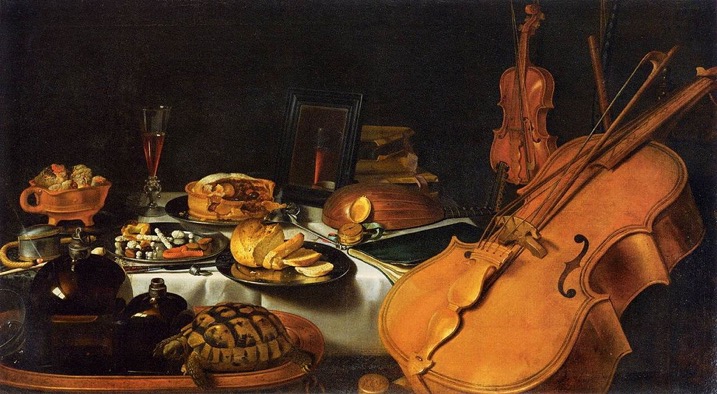
Pieter Claesz, Still life with Musical Instruments (1623)
"Bless This Damned Pandemic for reminding us how."
I speak this morning in praise of blessed inconvenience, as embodied by the once-familiar act of simply slicing bread. With the exception of that period when my mom went all Earth Mother on the family and took to baking her own bread, my early years experienced exclusively the pre-sliced variety bought day old in a small bakery for ten cents a loaf and stored in the trusty basement freezer. I saw in books photographs of the kind of bread people bought in Europe, dark, rotund, and unsliced, and I dreamed of pulling off handfuls to accompany some whiffy cheese, but we were no longer Europeans, and hadn't been for generations. As Americans, we never really thought about most of the conveniences we shared. We thought them a birthright accompanying what was more than simply The Good Life, but the very best life imaginable. Beret-wearing Communists might walk straight-faced while carrying a baguette or boule, but we never would, and not just because we couldn't.
Then I came to test taste a plain baguette and found it good. No, I found it far superior to any sponge cake imposter.
RushingRoulette
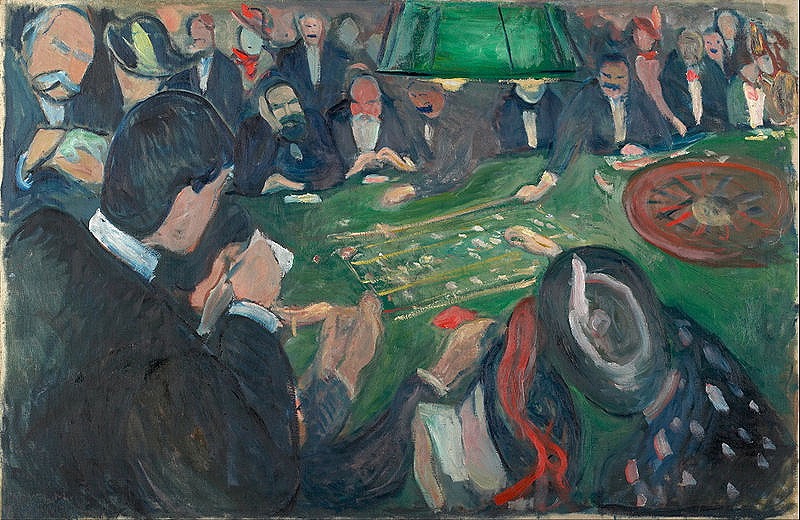
Edvard Munch, At the Roulette Table in Monte Carlo,1892
"Rushing into any roulette seems a fool's mission."
Every morning, some oleaginous politician encourages me to resume my "normal" activities, citing genuine statistics to justify their advice. I deeply doubt if they understand a word of their own justifications, for oleaginous politicians have never been elected on the basis of their deep understanding of Bayes theorem, or any other concept underlying statistical projection. Judging from the wild divergence between predicted and actual, their understanding might well be nonexistent, but true to all of us genuinely innumerate, mere failure to accurate predict hardly dissuades another morning spent hawking spurious convictions. Statistics has always been hard, mostly because our intuitions sucker us. Unbiased analysis demands an almost inhuman indifference and strict adherence to tenaciously counter-intuitive processes. Even analyzing results easily sucker-punches us, since we sometimes desperately want the numbers to agree with our a priori expectations, and when they do not, we're likely to fudge, touting the portion of the results that agree with us and burying those that don't.
We wallow in numbers now.
StayingPut

Artemisia Gentileschi’s Judith Beheading Holofernes, ca. 1614–20
"Not stir crazy yet, not by a long shot."
In this culture, we believe that strange things will happen to us if we simply StayPut. In Buddhist cultures, stillness might be aspired for, even revered, but we're a kinetic crew over here. We're up and gone as a matter of ingrained routine. We feel as though we haven't accomplished anything unless we've gone out somewhere then returned in-between. We make many round trip runs, almost always ending up just about where we started from, but with the added benefit, I guess, of having sandwiched a gone in there between the anchoring StayingPuts. If I were to deeply immerse myself into StayingPut, I might start stalking the hallways with an axe, chopping holes in otherwise perfectly innocent doors, slathering. I maybe might even turn into a creepy isolated old cat lady, newspapers piled to the ceiling. Or a shut-in, font of endless neighborhood rumors of what I might once have been, a definite haunted house has-been. StayingPut might be the most dangerous possible state for anyone seeking greatness or notoriety, and aren't we all in the Notoriety Business now? Excuse me, please, but I just gotta leave for awhile. I'll be right back. Not going anywhere, really, just … out.
We're StayingPut for our Staycation this summer, and not just because of our Governor's Stay At Home Order.
Circlings
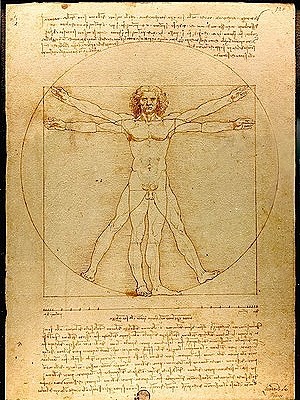
'The proportions of the human body according to Vitruvius', Leonardo da Vinci, about 1490.
" … a Muddle Ages, arguing over theology."
Our Damned Pandemic seems to have sparked a spike in circular reasoning, that form of thinking Bertram Russel once compared to larceny. We've been swiping answers we want, probably because we so want them to be true, for the nightmare to conclude, that we suddenly find ourselves capable of justifying anything and calling that conclusion perfectly reasonable. Circular solutions seem to prove their premise. Because of This, That AND because of That, This, deduction be damned. An induced solution seems to resolve the troubling problem. Hydroxychloroquine certainly seems to cure this 'flu,' except it isn't a flu and supporting evidence seems rather thin. An act of faith or firm believe gets involved and seems to securely seal the underlying logic. Hopefulness gets the better of us, inviting in a following fresh bout of despair. The meta-cycles of hopefulness and despair seem likewise circular, and we spend some days feeling as if we were circling around a huge drain.
We set our expectations innocently, stating our objective clearly. No harm and no foul.
Sorrying

Jacques Louis David, The Death of Socrates, 1787
" … no identity changing required."
The GrandOtter said, "Sorry."
"Sorry about what?" The Muse replied. "Sorry about saying you were sorry?"
I imagined an infinite spiral starting with an innocent sorry then circling ever further downward, one sorry inexorably spawning another, ad infinitum. Of course, The GrandOtter meant that she was sorry, though she sometimes prefers a more present tense and says that she 'is' sorry, after which I imagine I'm witnessing sorry incarnate. I thought I was sorry, though I more probably never was anything of the kind. Perhaps I felt sorry, which might prove to be as far from being sorry as anything could possibly be. No feeling defines anyone, for feelings come as information, not definition. One most certainly feels sorry without actually embodying that sorry state. I think we mostly forget this fact and whack ourselves with an ill-advised identity, when we were simply feeling sorry.
Sorry seems a sorry excuse and a worse apology.
LongHaul
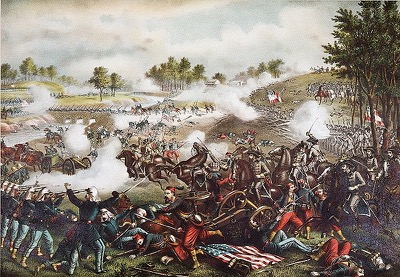
First Battle of Bull Run, chromolithograph by Kurz & Allison, 1889
"Heads you win, tails we lose."
Both Union and Confederate soldiers expected the first skirmish of the Civil War to decide the conflict's final outcome. Fine ladies in carriages accompanied troops to the battlefield, expecting a diverting exposition, an amusing afternoon's competition. The Army of the Potomac outnumbered the rebel forces, which were hardly an organized army by then, but were filled with fervor. Neither side imagined the possibility that they might lose. The Union crawled chastised back to Washington that evening, and thus began a long ordeal during which the futility of the rebellion never seemed to settle in. Each side won some and lost some, but each side's dedication rarely wavered. The Confederacy quickly became a brutal autocracy, starving itself in ever-deepening delusion that their dedication might ultimately count for something. They touted Lee as the superior strategist, though he managed to lose every significant conflict. He'd won at Bull Run then went on to narrowly retreat from Antietam and Gettysburg. The terms of engagement seemed to have been set on that midsummer day in Northern Virginia. The manner of engagement largely remained intact throughout.
Both British and German troops cheered their way to the Marne in 1914, thinking themselves on an organized holiday.


